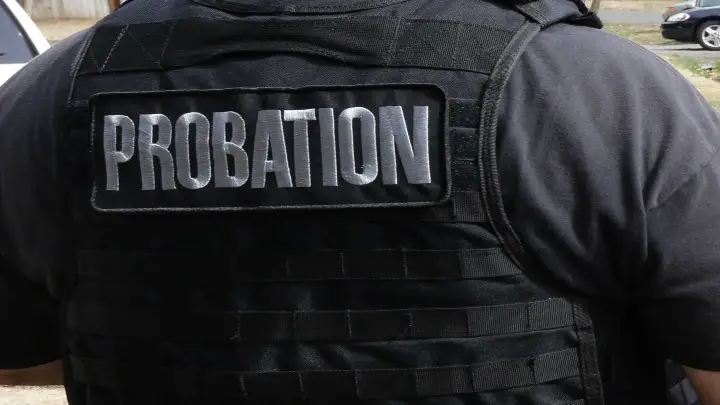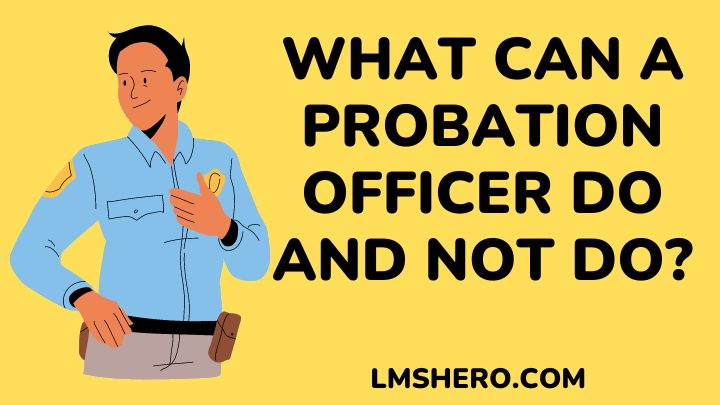A probation officer is responsible for supervising an offender placed on probation. This officer ensures that the offender does not breach agreements during the probation period. But what are the things he can and not do?
A probation officer monitors and reports any violation committed by an offender on probation. He or she also reports violations to the offender’s supervisor for appropriate disciplinary action.
This article discusses in detail what probation officers can do, what they cannot do, their responsibilities, and what to do if you find a probation officer violating the law
Let’s get started.
What is a probation officer?

A probation officer (or a parole officer) is a public servant who helps people convicted of a crime adhere to their sentence.
Their job is to provide support and guidance to those convicted of a crime so they may avoid further criminal activity.
They may also supervise people who have been released from prison or jail and help them reintegrate into society.
The law requires that the officer meet the individual from time to time to help with their recovery and rehabilitation.
Furthermore, any breach or default the probation officer notices are reported to the supervisor for immediate action.
What are the responsibilities of a probational officer?
1. Determine the level of assessment needed
It is up to the probation officer to determine an offender’s risk level. Depending on the criminal level of the offender, it could be either a medium, medium, or maximum level of assessment.
The outcome of this assessment would determine how often the offender meets with the probation officer. It could be weekly or monthly, but mostly on special occasions.
2. Determine if an offender is likely to commit another crime
Through an assessment gauge, a probation officer must determine if an offender is likely to commit another crime.
This is done by monitoring how the individual relates with the community, usually, this is referred to as “community ties.
3. Determine if additional support is needed
After supervising an offender, the probation office is supposed to determine if additional support is required.
This support could either be financial, in the form of employment, or psychological, in the form of rehabilitation.
4. Provide regular updates on the present offender
After the assessment, the officer is expected to report back to the supervisor.
This report could be updated with information about where the offender works, his or her problems, or objectives.
5. Set up opportunities for outgoing offender
When an offender is released, a probation officer is expected to assist that person in various ways.
This could be through counseling, job opportunities, housing, or getting the offender involved in social activities.
What can a probation officer do and not do?
There are several things that a probation officer has the right to do and not do. Below is a list of what he can and can not do;
A probation officer can do the following;
1. Organize regular drug test
It is legal for a probation officer to schedule regular tests for the offender. This is done to determine if the offender complies with the “no drug and alcohol” law regarding probation.
2. Change the condition of your probation release
A probation officer can change your assessment level or the condition of your probation release. This is usually done when foul play is suspected, or an offender tests positive on a drug test.
3. Schedule impromptu meetings
At any point in time, the probationary office can call for an unscheduled meeting if he has a reason. Mostly to speak, evaluate current situations, or even provide help or recommendations.
4. Report any act of violent conduct
If a probation officer deems a character or an act to violate the law, he can report directly to the supervisor. This means that the offender could face being jailed or on probation for longer.
A probation officer cannot do the following;
1. Leak incriminating information to other people
A parole officer is deemed to have violated his right if he shares incriminating information with other people.
Any information about the offender is supposed to be reported to the supervisor alone for further action.
Additionally, if a probation officer violates this law, the offender has a legitimate reason to change officers.
2. Harass an offender
Any attempt by a parole officer to harass an offender is also considered highly inappropriate. This could be verbal, physical, or even sexual harassment.
It is highly unprofessional and should be reported immediately for proper action. Other acts such as flirtatious behaviors, exchanging gifts, or meeting at undisclosed locations are also inappropriate.
3. Discriminate against an offender
It is illegal for a probation officer to discriminate against an offender because of their race, sex, sexual orientation, age, or religion. When an officer uses a racial slur, it is best to report it immediately.
There are legal repercussions for such events, it also warrants a change in probation officer.
4. Break into an offender’s house to search
A probation officer is not permitted to break into an offender’s house for a few reasons. Either he has a warrant, a life or death threat, or he spots any contraband with the offender.
This contraband could be drugs, guns, or alcohol. However, if the officer has no warrant and spots no life danger or contraband, he is not permitted to enter or search the offender’s house.
What do you do when your probation officer violates the law?
If you find your parole officer violating the law, there are two things to do. They are;
1. Report to your supervisor
If you find any violation, you can complain to the officer to your supervisor. It would be best to do it face to face rather than write or call about it.
Simply schedule a meeting with your supervisor while ensuring you go with evidence if there are any to aid your case.
2. Report to a chief judge
If you need to, you can report directly to the chief judge assigned to your case. With evidence, you can write an official statement stating your complaints or worries concerning your PO.
The chief judge is the ultimate authority and knows what to be done about such issues.
FAQs
Can a probation officer search your house?
Yes, but only if he possesses an official warrant or spots contraband in your house. However, if he does not, he is not permitted to search your house.
Has everyone on probation been to jail?
No, not all individuals on probation have been to jail. It could also be that the offender’s case wasn’t deemed to come with any prison sentence yet.
Does probation mean supervision 24 hours a day?
No, it does not. Only if the case is deemed to require maximum assessment by the PO.
Can probation officers arrest like actual police officers?
Yes, they can. If you violate, a PO can arrest you as police officers do.
Conclusion
In short, a probation officer can monitor an offender but cannot breach the laws. This breach could be harassment, discrimination, or disclosing personal information to an unauthorized third party.
I hope you enjoyed this article. If you did, you should also see if all office jobs require a drug test.
Thanks for reading this article.







